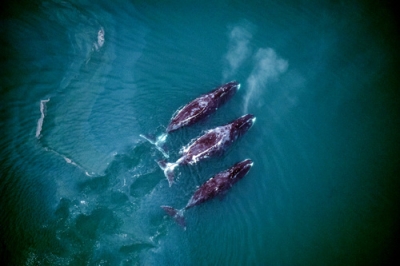
In the wild, several species of birds and animals move from one region to another– some of them even cross continents. This temporary movement is called migration, and there are many reasons behind this. It could be to find a breeding ground, to find food, or even to escape the extreme weather in the region they inhabit. For migrating species, this movement is a regular process, and is crucial in keeping themselves and their species alive. However, studies have shown that climate change could be impacting migration. For instance, according to a 2019 study in the US, “Rising temperatures are causing birds to migrate a little earlier each spring“. It discovered that their journey home is getting advanced by about two days each decade. Another recent study has shown that bowhead whales completely skipped migration a couple of years ago. Why did they do it, and how was this discovered?
What happened?
Bowhead whales reside completely in the Arctic and sub-Arctic waters, and requires temperature between -0.5 and 2°C to thrive. There are different groups of bowhead whales in the Arctic. One group – what about 20,000 whales – travels every year from the Bering Sea via the Chukchi Sea In spring to the Beaufort Sea to spend the summer there. The population returns to the Bering sea in autumn, and stays there in winter. And the cycle continues. But then, Researchers in Canada discovered that this population did not take up the usual 6000-km round trip in 2018–2019 after spending the summer in the Beaufort Sea, the population had remained there during the winter instead of heading to the Bering sea.
Why?
Scientists have considered several reasons for this. One of the important reasons is that warming waters had led to less ice cover during the season. Since this usually helps in the large-scale movement of the bowhead whales’ predator orca or killer whales, it is assumed that bowhead whales stayed where they were due to “predator avoidance”. Another reason suspected is the erratic and early bloom of plankton in the region, a key food source which the bow head whales could have hoped to feast on. Yet another suggestion is that due to warming temperatures, the water in their migration route could have fallen outside their ideal temperature range, and so the whales must have decided to skip on the journey altogether. Whatever their reasons, it seems likely that climate change has had an important role to play in their unusual behaviour.
How was this discovered?
The researchers in Canada went through several hours of audio recordings captured by underwater devices used for regular data collection. And then they discovered the distinctive calls of the bowhead whales, which should have been in their wintering grounds. As one media report says, “Eerie wails, explosive trumpets and ghostly moans. The sounds from the underwater recorders had a story to tell, even without a single intelligible word: the whales had stayed put.”
Picture Credit : Google




